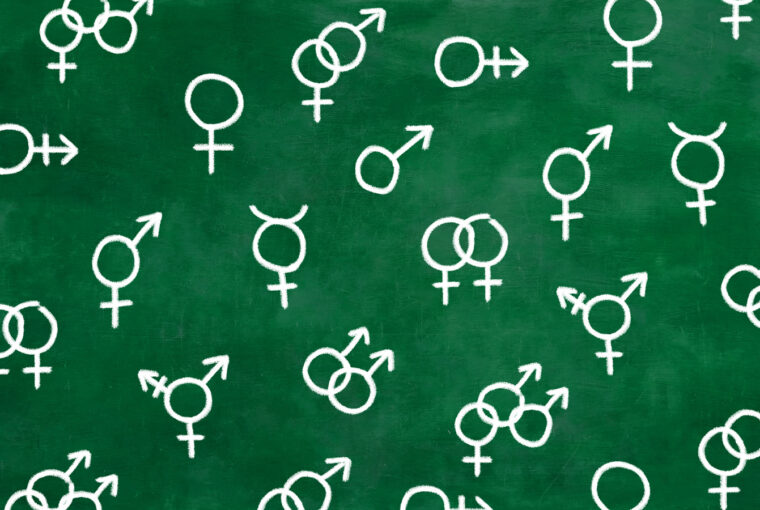10 Reminders for Building Queer & Trans-Inclusive (Sex) Education
As a sex educator, my educational focus is, of course, sex.
However, being intentionally inclusive of different communities should be standard practice, not just reserved for specific spaces. The following reminders and tips can be incorporated in health & sex ed classes but also biology, history, and general learning environments.
-
Ask pronouns (she/they/zir/he, etc.).
When hosting an event or facilitating a space, make sure to ask everyone to name their gender pronouns in addition to their names. If you use nametags, make it standard practice to include pronouns there as well. The onus should not be on trans people to begin this discussion nor to enforce the practice.
*Ze/Zir/Zirs is one example of gender neutral pronouns developed to offer singular third person options outside of they/them/theirs.
-
Recognize that sexual orientation is different from gender identity.
Because of the acronym LGBTQIA+, there is some confusion about the relationship between sexual/romantic orientations (like gay, straight, pan, etc.) and gender identities (like cisgender, transgender, nonbinary, etc.). While we are all lumped together as part of political and social movements, these are separate identities and can be mixed and matched in infinite ways like any other identity such as religion or race.
-
Bodies and body parts don’t have a gender.
When explaining actions involving bodies, name the body part without assigning it a gender. For example, for a condom demonstration, you can say, “This is how you put an external condom on a phallic shape like a penis or dildo.” This statement creates space for sexual partnering and activities that may include non-penis phallic items like dildos without associating penis with a specific gender.
-
Bodily functions don’t have a gender.
Similar to bodies, people often associate functions such as menstruation, erections, and birth with a particular sex and gender. You can easily discuss these experiences without assigning gender to avoid causing body dysphoria. For example, “Children with vulvas will often experience menstruation as they go through puberty.” This acknowledges that children of different genders can experience menstruation, while also leaving room for conversation around why some children with vulvas may not experience menstruation (low body fat, being intersex, etc.).
-
Romance and sex occur across gender and sexual orientation lines.
Cisheteronormativity is the assumption that people and society are cisgender and straight. To counteract this narrative, if you are using genders to illustrate a romantic or sexual encounter, make sure to give examples that involve a mix of pairings between men, women, and gender non-binary folks. Be aware of the racialized connotations of the names you use and how/where you choose certain names over others.
-
The A in LGBTQIA+ is not for ally.
Don’t forget about asexual folks when talking about sexual orientation. There is debate from within the Ace community about whether they belong as a sexual orientation, but this debate should not be fueled by others leaving them out of discussions and community spaces. On a related thread, intersex folks are also often left out of conversations about sex despite comprising 1-2% of the human population!
-
Normalize inclusive language.
“Women” and “men” are terms that encompass all those who identify that way. This means that “women” includes cis and transwomen and “men” includes cis and transmen. Do not fall into the trap that allows the universal terms, “woman” and “man”, to stand in for cisgender experiences because this elevates being cisgender as normative while erasing trans people from the narrative.
-
Not all trans people are part of the binary.
While many trans people identify as men and women, there are many who do not fit within the binary. This includes gender non-binary, gender-fluid, genderqueer, two-spirit, etc. people. Because the belief in the gender binary of men and women is so pervasive, it can be difficult for people to comprehend anything else. Activities that question expected gender associations can help begin to dispel these assumptions and norms.
-
Respect difference.
Recognize that language is not universal. I use queer because of the time and space I was socialized BUT there are people for whom that term is offensive. Use language that is considered most respectful for your population, while being open to the ways everyone self-identifies. Invite (respectful) conversation about terms and answer questions to the best of your abilities while offering to look up anything with which you are unfamiliar.
-
Teach LGBTQIA+ history.
The modern movement for LGBTQIA+ rights was led by TransWOC (women of color) like Marsha P. Johnson and Sylvia Rivera. There are cultures around the world that have third genders actively recognized like the Hijra in India and Two-Spirit (this is a pan-identity term used to represent a variety of experiences across multiple tribes) people of Native tribes. There are references to multiple genders/sexes in the Talmud, a Jewish text written 1,500 years ago. Our cousins in the animal kingdom engage in same-sex behaviors. Our existence is neither new nor unnatural and these are messages that people need to receive to address stigma.
Seeking to develop queer and trans inclusive curriculum/spaces or revise what you currently use? Fill out this form and Yael will contact you!









